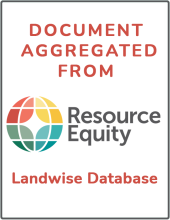Land Library Search
Through our robust search engine, you can search for any item of the over 73,000 highly curated resources in the Land Library.
If you would like to find an overview of what is possible, feel free to peruse the Search Guide.
/ library resources
Showing items 1 through 9 of 46.In Ethiopian development policies, pastoralist areas have recently attracted more attention. However, much debate and policy advice is still based on assumptions that see a sedentary lifestyle as the desirable development outcome for pastoralist communities.
The major economic activity for pastoralists is animal husbandry. The harsh environment in which herders raise their livestock requires constant mobility to regulate resource utilisation via a common property regime.
There is growing degradation in sylvo-pastoral lands that were originally under common property regimes, but over which the state now asserts ownership.
Secure land rights are important for development and poverty reduction and the greatest challenges for providing such rights are in urban, peri-urban areas, and the most productive rural areas.
Las élites de los Estados Unidos están profundamente polarizadas. La polarización de los partidos Demócrata y Republicano se encuentra en su punto más alto desde finales del siglo XIX. ¿Cómo puede explicarse este fenómeno a la luz del evidente crecimiento económico de los Estados Unidos?
Although several institutional and management approaches that address the degradation of the rangelands have been tested in the dry areas of Central and West Asia and North Africa (CWANA), impact has been limited.
This paper examines interethnic conflict on grazing land previously accessed as common property. The study was undertaken in Mieso District of eastern Ethiopia where two ethnic groups experience different production systems pastoral and agropastoral.
This report seeks to present micro evidence on how environmental changes affect poor households. It focuses primarily on environmental resources that are outside the private sphere, particularly commonly held and managed resources such as forests, fisheries, and wildlife.








